Support for disposable chroot environments (pbuilder), which can be very useful for C and C++ projects
Node Setup
On every node, where you want to run the plugin, you have to
-
install pbuiler:
apt-get install pbuilder -
Allow jenkins to use pbuilder:
jenkins_user ALL=(ALL) NOPASSWD: /usr/sbin/pbuilder
Setup a Chroot Environment
Minimal Setup
Create chroot environments in Manage Jenkins > Chroot Environments:
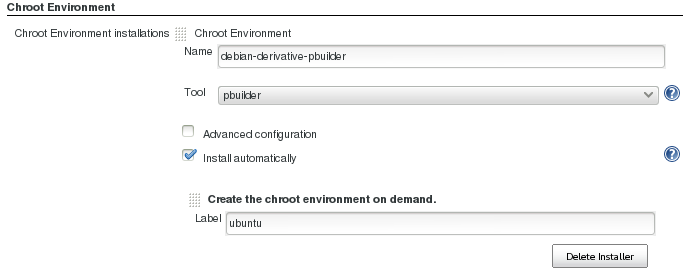
Make sure that "Install Automatically" is selected, and is configured to use the "Create the chroot environment on demand" installer!
Advanced Setup
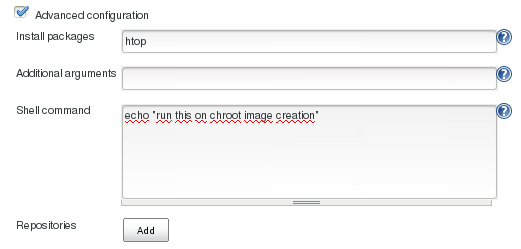
Adding repositories
You can add ppa's and standard repositories like universe. The plugin distinguishes between the two types by the Repository URL prefix. If it starts with deb, the repository is just added to /etc/apt/sources.list.d/ and the key is imported. If the URL starts with ppa, the repository is added via add-apt-repository (no keyfile is required).
Adding the universe repository
Name: universe
Repository URL: deb http://archive.ubuntu.com/ubuntu DISTRO universe
Keyfile URL: http://archive.ubuntu.com/ubuntu/project/ubuntu-archive-keyring.gpg
Make sure to select the correct distro of the chroot environment. By default a chroot environment similar to the host system where the node is running is created.
In the screenshot at the end of this section i have used lucid.
Adding ubuntugis ppa
Name: ubuntugis
Repository URL: ppa:ubuntugis/ubuntugis-unstable
The resulting repositories section should now look like this:
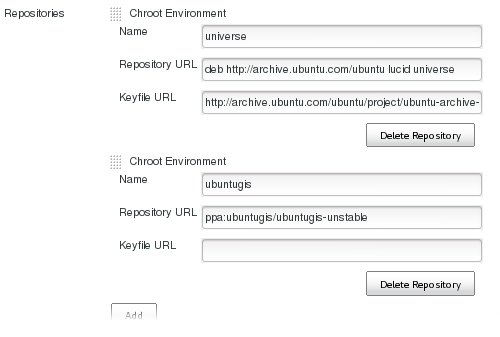
Using a Chroot Environment
Minimal Setup
After you have configured a Chroot-Environment, it can be used in the Chroot Buildstep in every job.
Make sure, that you restrict the job to nodes where pbuilder is
configured.

Add a Chroot Buildstep:
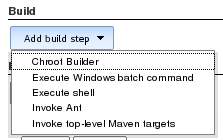
Select the chroot environment and add the build instructions:
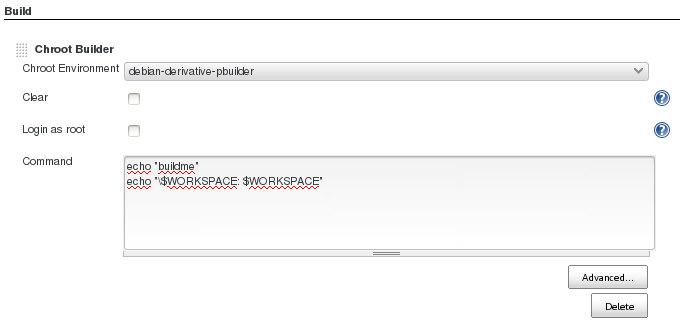
Chroot Environment: A list of the predefined chroot environments
Clear: The chroot environment (of the job) will be reset to the state of the predefined environment before every build ( better reproducability, slower build)
Login as root: The build comands will be run via the root unser inside of the environment (although it is inside the environment, be carefull what you do!)
Command: the build commands (uses bash per default)
Note, that all the jenkins specific environment varaibles are available!
Advanced Configuration

Requirement Files: Files which contain package dependencies (comparable to requirements.txt in the python world)
Requirements: Additional package dependencies, not listed in any requirement file
Ignore exit code: The build will always succeed, no mather if the build step fails or not.
Do not update repository indices: speeds up the build, but will not fetch and install the newest versions of the packages
Force installation of packages: allows the installation of unsigned packages (can be dangerous)
Run the job
After configuring a new chroot instance it will be built along with the first job which uses this environment. When launching the build, you will encounter something like this:

Here the two previously configured repositories (ubuntugis and universe) are added:
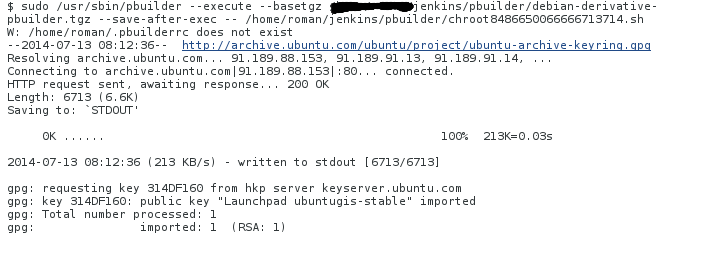
These steps are part of the initial creation of the environment, which can take a few minutes. They are only excuted once, if you add a completely new environment, or if you change the existing configuration in the Jenkins System configuration.
This is what we actually wanted to do in the build (as stated before, the $WORKSPACE variable was available inside the chroot environment):

Roadmap
- mock support is next
Changelog
Version 0.1.4
- add support for Ubuntu > 12.04
- better detection if the chroot binary is correctly set up for Jenkins
- correctly process additional chroot arguments with quotes
Version 0.1.2
- fixes a null pointer exception when building on a slave node
- uses 'local' copying of chroot image FilePaths, no more network involved
- removes useless tarBall field from ChrootToolsetProperty
- detects aborted/failed chroot environment initializations
Version 0.1.1
- adding description and wiki page to pom
Version 0.1
- initial release
- pbuilder support (mock not usable at the moment)